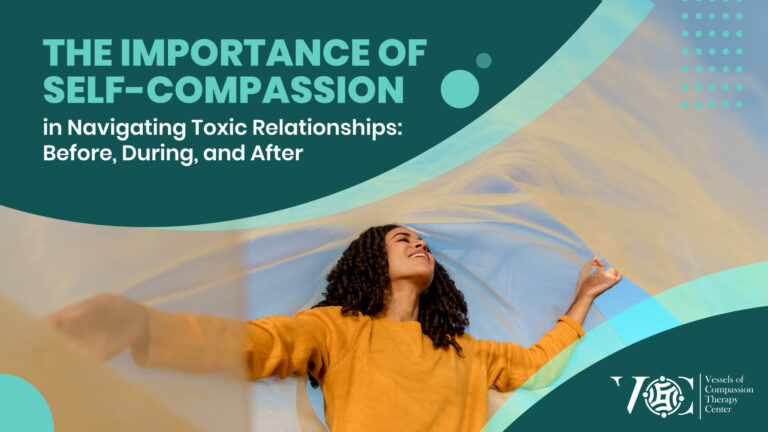Leaving a toxic relationship can be one of the most challenging and emotionally draining experiences in life. Whether you’re still in the relationship, trying to leave, or healing after you’ve left, self-compassion is an essential tool for healing and growth. Unfortunately, toxic relationships often erode self-worth, making it difficult to be kind and gentle with yourself. Learning to practice self-compassion, however, is crucial for rebuilding confidence, setting healthy boundaries, and fostering emotional resilience.
What Is Self-Compassion?
Self-compassion is the practice of treating yourself with the same kindness, empathy, and care that you would offer a close friend. It involves three main components:
- Self-kindness: Being gentle with yourself instead of critical when you make mistakes or face difficulties.
- Mindfulness: Acknowledging your feelings without over-identifying with them or letting them take control.
- Common humanity: Recognizing that everyone experiences pain, suffering, and failure, and that you are not alone in your struggles.
These components work together to create an emotional safety net that supports you through tough times, including toxic relationships.
Self-Compassion While Still in a Toxic Relationship
When you’re in the midst of a toxic relationship, it’s common to feel trapped, confused, or even to blame yourself for the situation. This is often due to emotional manipulation, gaslighting, or prolonged exposure to unhealthy behaviors that can distort your sense of reality.
During this time, self-compassion is crucial because it can help you:
- Acknowledge your pain: It’s important to validate the hurt and discomfort you’re feeling instead of brushing it aside. Recognizing that it’s okay to feel upset or confused allows you to take the first step toward healing.
- Avoid self-blame: Toxic relationships can make you feel like you’re the problem, but self-compassion reminds you that everyone deserves love and respect. You are not responsible for someone else’s toxic behavior.
- Find strength: Self-compassion gives you the emotional space to begin thinking about what you truly deserve and helps you build the courage to seek change.
Self-Compassion While Trying to Leave a Toxic Relationship
Leaving a toxic relationship is difficult. You may struggle with feelings of guilt, fear, or doubt. Emotional attachments, even unhealthy ones, can be hard to break, and the process may be fraught with moments of self-doubt. Practicing self-compassion at this stage is essential.
Here’s how self-compassion can support you when you’re trying to leave:
- Reduce guilt: It’s common to feel guilty about leaving, especially if your partner tries to manipulate you into staying. Self-compassion helps you recognize that you deserve to prioritize your own mental health and well-being.
- Embrace the difficulty: Leaving won’t always feel easy, but being kind to yourself in moments of doubt or fear will help you move forward. Understand that struggling does not mean you are weak; it means you are human.
- Stay grounded: Practicing mindfulness, a key aspect of self-compassion, can help you stay centered during moments of high emotional stress. It allows you to observe your thoughts and feelings without letting them overwhelm you.
Self-Compassion After Leaving a Toxic Relationship
Once you’ve left the toxic relationship, the emotional work doesn’t stop. In fact, the post-relationship phase often brings its own set of challenges, such as low self-esteem, grief, or lingering feelings of shame. During this period, self-compassion is key to rebuilding your sense of self and recovering from emotional wounds.
Here’s how self-compassion plays a role after you’ve left:
- Healing emotionally: It’s natural to feel a range of emotions—anger, sadness, relief—after leaving. Self-compassion allows you to sit with these feelings without judging yourself for having them. Healing is a process, and it’s okay to take time to fully recover.
- Rebuilding self-worth: Toxic relationships often erode your sense of self, making it hard to trust yourself or others. Practicing self-compassion helps you rebuild your self-esteem and reminds you that you are worthy of love and respect.
- Moving forward: Self-compassion encourages you to embrace personal growth without harsh self-criticism. It helps you forgive yourself for any perceived mistakes, such as staying in the relationship too long or falling into familiar unhealthy patterns. This forgiveness is key to moving on and creating healthier relationships in the future.
How to Practice Self-Compassion in Your Healing Journey
If self-compassion is new to you, it may feel unfamiliar or even uncomfortable at first, especially if you’ve spent a long time in a toxic relationship where you were made to feel unworthy. Here are a few ways to start:
- Talk to yourself like a friend: When you catch yourself being overly critical, imagine what you would say to a friend in the same situation. Replace negative self-talk with words of comfort and kindness.
- Practice mindfulness: Take a few minutes each day to sit with your thoughts and emotions. Notice them without judgment and remind yourself that it’s okay to feel whatever you’re feeling.
- Write a self-compassion letter: When you’re feeling particularly low, write yourself a letter of encouragement and empathy. Acknowledge your pain but also offer yourself the comfort and understanding you deserve.
Final Thoughts
Navigating a toxic relationship, whether you’re still in it, trying to leave, or healing afterward, is an emotional journey that requires strength and resilience. Self-compassion is the foundation that will help you through each stage. It offers the kindness, forgiveness, and understanding that toxic relationships often lack. By cultivating self-compassion, you can break free from the emotional chains of toxic relationships and move toward a healthier, more fulfilling future.
If you’re struggling with leaving or healing from a toxic relationship, remember: you deserve love, peace, and respect—and it all starts with giving those things to yourself.
